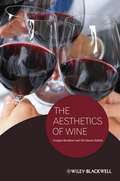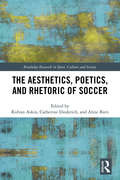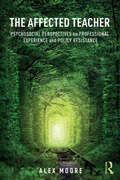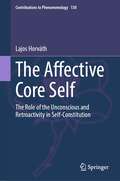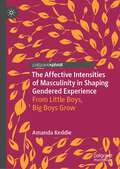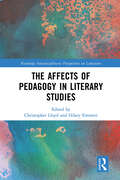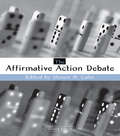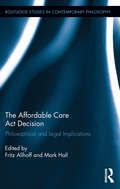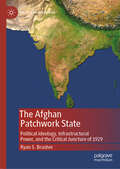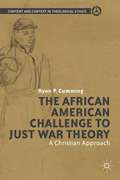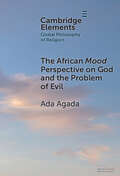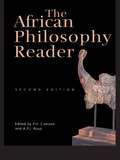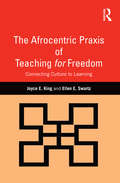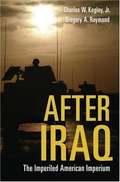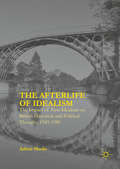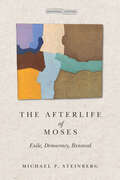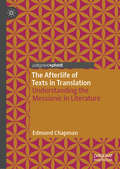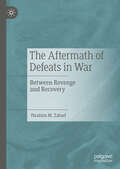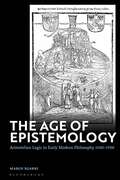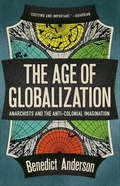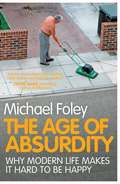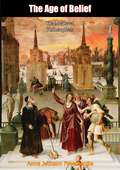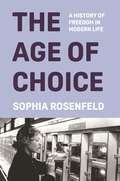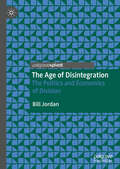- Table View
- List View
The Aesthetics of Wine
by Ole M. Skilleas Douglas BurnhamThe Aesthetics of Wine shows that discussing wine within the framework of aesthetics both benefits our understanding of wine as a phenomenon, while also challenging some of the basic assumptions of the tradition of aesthetics.Analyzes the appreciation of wine as an aesthetic practice. Tackles prejudices against bodily senses, showing how they distort traditional aesthetic theory Represents the beginnings of a reformulation of general aesthetics
The Aesthetics, Poetics, and Rhetoric of Soccer (Routledge Research in Sport, Culture and Society)
by Ridvan Askin Catherine Diederich Aline BieriSoccer has long been known as 'the beautiful game'. This multi-disciplinary volume explores soccer, soccer culture, and the representation of soccer in art, film, and literature, using the critical tools of aesthetics, poetics, and rhetoric. Including international contributions from scholars of philosophy, literary and cultural studies, linguistics, art history, and the creative arts, this book begins by investigating the relationship between beauty and soccer and asks what criteria should be used to judge the sport’s aesthetic value. Covering topics as diverse as humor, national identity, style, celebrity, and social media, its chapters examine the nature of fandom, the role of language, and the significance of soccer in contemporary popular culture. It also discusses what one might call the ‘stylistics’ of soccer, analyzing how players, fans, and commentators communicate on and off the pitch, in the press, on social media, and in wider public discourse. The Aesthetics, Poetics, and Rhetoric of Soccer makes for fascinating reading for anybody with an interest in sport, culture, literature, philosophy, linguistics, and society.
The Affected Teacher: Psychosocial Perspectives on Professional Experience and Policy Resistance
by Alex MooreAt a time when teaching and learning policy too often presents itself in a simplistic input-output language of measurable targets and objectives, The Affected Teacher explores the role played by emotionality in how professional life is experienced by school teachers. The book argues that, in the very highly organised and structured social spaces of public institutions, emotionality - or, more precisely, all that is included in the concept of ‘affect’ - needs to be recognised and validated, rather than ignored or pathologised. It explores how neoliberal education policy seeks to mould professional subjectivities, relationships and practices; how teachers experience and ‘manage’ their feelings; and the role that affect plays in guiding either compliance with or resistance to often unpopular policy directives. Drawing on a rich body of original data comprising formal and informal discussions with a range of teachers, the case is argued for psychoanalytically and politically informed individual and group reflexivity, both as a form of professional and personal development and as a way of keeping alive alternative beliefs and understandings regarding the purposes of education. The Affected Teacher is relevant to practising schoolteachers and to undergraduate and graduate students and academics involved in education related courses such as policy studies, education management and the sociology of education, as well as disciplines related to psychosocial studies and psychoanalysis.
The Affective Core Self: The Role of the Unconscious and Retroactivity in Self-Constitution (Contributions to Phenomenology #130)
by Lajos HorváthThis book extends the contemporary concept of the minimal self by introducing the affective core self. The overall aim is to integrate certain psychoanalytical ideas into the phenomenological investigation of passivity and reformulate the idea of the phenomenological unconscious. This volume contributes to the multidimensional analysis of the self by positioning the affective core self between the layers of the more minimal and the less minimal self. It underscores the importance of the unconscious in the constitution of the affective core self by providing the comparative analysis of the phenomenological and the psychoanalytical unconscious.Furthermore, comparisons are drawn between Freud’s conception of the afterwardsness of trauma and the phenomenological notion of retroactive sense-constitution. The book concludes that retroactive sense-making is a double-sided phenomenon and differentiates between implicit-bodily and conscious-narrative retroactive sense-constitution. In order to bolster the idea of implicit-bodily sense-constitution the volume also examines and utilizes contemporary insights on the nature of body memory. The conclusion claims that the affective core self is constituted in time by means of the underlying processes of the two-sided retroactive sense-constitution. This text appeals to students and researchers working in phenomenology and philosophy of mind.
The Affective Intensities of Masculinity in Shaping Gendered Experience: From Little Boys, Big Boys Grow
by Amanda KeddieThis book tells a story of masculinity through the experiences of one boy, ‘Adam’. From four different studies and time periods, it tracks moments of significance in his life over a period of 20 years. These moments highlight the ways in which Adam is both drawn towards and away from a hegemonic masculinity of physical toughness, domination, competition and an opposition to ‘the feminine’. The book is set against the backdrop of a long history of contentious gender politics in Australia and globally but particularly responds to the renewed attention to the social construction of masculinities in the current #MeToo climate. Against this backdrop, nuanced and longitudinal accounts of boys’ and men’s experiences of masculinity are significant because they can offer insight into the complex bodily, social, economic, and historical forces that configure masculinities. Such understandings are important in our endeavours as those who educate, support and work with boys and men to transform gender inequalities.
The Affects of Pedagogy in Literary Studies (Routledge Interdisciplinary Perspectives on Literature)
by Christopher Lloyd Hilary EmmettThe Affects of Pedagogy in Literary Studies considers the ways in which teachers and students are affected by our encounters with literature and other cultural texts in the higher education classroom. The essays consider the range of emotions and affects elicited by teaching settings and practices: those moments when we in the university are caught off-guard and made uncomfortable, or experience joy, anger, boredom, and surprise. Featuring writing by teachers at different stages in their career, institutions, and national or cultural settings, the book is an innovative and necessary addition to both the study of affect, theories of learning and teaching, and the fields of literary and cultural studies.
The Affirmation of Life: Nietzsche on Overcoming Nihilism
by Bernard ReginsterAmong all the great thinkers of the past two hundred years, Nietzsche continues to occupy a special place--not only for a broad range of academics but also for members of a wider public, who find some of their most pressing existential concerns addressed in his works. Central among these concerns is the question of the meaning of a life characterized by inescapable suffering, at a time when the traditional responses inspired by Christianity are increasingly losing their credibility. While most recent studies of Nietzsche's works have lost sight of this fundamental issue, Bernard Reginster's book The Affirmation of Life brings it sharply into focus. Reginster identifies overcoming nihilism as a central objective of Nietzsche's philosophical project, and shows how this concern systematically animates all of his main ideas. In particular, Reginster's work develops an original and elegant interpretation of the will to power, which convincingly explains how Nietzsche uses this doctrine to mount a critique of the dominant Christian values, to overcome the nihilistic despair they produce, and to determine the conditions of a new affirmation of life. Thus, Reginster attributes to Nietzsche a compelling substantive ethical outlook based on the notions of challenge and creativity--an outlook that involves a radical reevaluation of the role and significance of suffering in human existence. Replete with deeply original insights on many familiar--and frequently misunderstood--Nietzschean concepts, Reginster's book will be essential to anyone approaching this towering figure of Western intellectual history.
The Affirmative Action Debate
by Steven M. CahnThis book is an essential guide to the full range of arguments surrounding affirmative action. Following the debate, as no other collection does, from all the early foundational articles to up-to-date selections, the book presents the strongest contributions from both sides of this highly charged issue. For students and general readers seeking to understand the controversy, this book offers a unique guide to the main lines of argument in the discussion. The contributors include most of the major contributors to the debate: Anita L. Allen, Robert Amdur, Michael D;. Bayles, Tom L. Beauchamp, Barbara R. Bergmann, Derek Bok, William G. Bowen, Carl Cohen, J. L. Cowan, Ronald Dworkin, Robert K. Fullinwider, Alan H. Goldman, Sidney Hook, James W. Nickel, William A. Nunn III, George Sher, Robert Simon, Paul W. Taylor, Abigail Thernstrom, Stephen Thernstrom, Judith Jarvis Thomson, Celia Wolf-Devine, and Paul Woodruff.
The Affordable Care Act Decision: Philosophical and Legal Implications (Routledge Studies in Contemporary Philosophy)
by Mark Hall Fritz AllhoffInterest in NFIB v. Sebelius has been extraordinarily high, from as soon as the legislation was passed, through lower court rulings, the Supreme Court’s grant of certiorari, and the decision itself, both for its substantive holdings and the purported behind-the-scene dynamics. Legal blogs exploded with analysis, bioethicists opined on our collective responsibilities, and philosophers tackled concepts like ‘coercion’ and the activity/inactivity distinction. This volume aims to bring together scholars from disparate fields to analyze various features of the decision. It comprises over twenty essays from a range of academic disciplines, namely law, philosophy, and political science. Essays are divided into five units: context and history, analyzing the opinions, individual liberty, Medicaid, and future implications.
The Afghan Patchwork State: Political Ideology, Infrastructural Power, and the Critical Juncture of 1929 (Politics of South Asia)
by Ryan S. BrasherThis book provides a theoretically grounded and empirically fine-grained analysis of uneven state development in Afghanistan beginning in the early 20th Century. Based on archival research, the book shows that after Amanullah Shah’s abortive modernist authoritarian experiment and Habibullah Kalakani’s brief rule, a newly empowered Musahiban dynasty charted a patrimonial absolutist course. The new regime delegated considerable authority to traditional tribal areas in the southeastern and eastern part of the country, while pursuing a coercive strategy in other parts of the country that usurped traditional leadership at the regional and local levels. Previous explanations of the weakness of the Afghan state tend to emphasize structural determinants such as difficult geography, acephalous tribal organization, ethnic heterogeneity, as well as colonial interventions. Others have focused only on events after the Soviet or NATO interventions, pointing out faulty external decision-making, corrupt government officials and warlords, neighboring insurgent safe havens, or the international aid-fueled rentier economy. This book proposes an intermediate explanation for the patchwork nature of the Afghan state rooted in institutional choices made by a new ruling elite that took over in 1929. The year represents one critical juncture in Afghan history, where individual agency based on certain ideological preferences set in motion a path-dependent process that shaped its politics well into the latter half of the century.
The African American Challenge to Just War Theory
by Ryan P. CummingIn this innovative treatment of the ethics of war, Ryan P. Cumming brings classical sources of just war theory into conversation with African American voices. The result is a new direction in just war thought that challenges dominant interpretations of just war theory by looking to the perspectives of those on the underside of history and politics.
The African Mood Perspective on God and the Problem of Evil (Elements in Global Philosophy of Religion)
by Ada AgadaThis Element concisely and critically explores the African limited God perspective that denies that the categories of omnipotence, omniscience, and omnibenevolence are applicable to the God of African Traditional Religion (ATR). The Element teases out the intricate conceptual nuances in the limitation thesis and interrogates the divergent stances of proponents of the limited God view, with special focus on the mood perspective of the philosophy of consolationism. Proponents of the limitation thesis may be limited God theists who accept that the limited God is a creator-deity or, at least, a world-designer, or limited God non-theists who deny the limited God personality and agency. The Element expands the frontiers of research in African philosophy of religion by showing that the limitation thesis raises the question of a limited God's moral responsibility for some of the evil in the world in his capacity as a world-creator or world-designer.
The African Philosophy Reader
by P. H. Coetzee A.P.J. RouxDivided into eight sections, each with introductory essays, the selections offer rich and detailed insights into a diverse multinational philosophical landscape. Revealed in this pathbreaking work is the way in which traditional philosophical issues related to ethics, metaphysics, and epistemology, for instance, take on specific forms in Africa's postcolonial struggles. Much of its moral, political, and social philosophy is concerned with the turbulent processes of embracing modern identities while protecting ancient cultures.
The Afrocentric Praxis of Teaching for Freedom: Connecting Culture to Learning
by Joyce E. King Ellen E. SwartzThe Afrocentric Praxis of Teaching for Freedom explains and illustrates how an African worldview, as a platform for culture-based teaching and learning, helps educators to retrieve African heritage and cultural knowledge which have been historically discounted and decoupled from teaching and learning. The book has three objectives: To exemplify how each of the emancipatory pedagogies it delineates and demonstrates is supported by African worldview concepts and parallel knowledge, general understandings, values, and claims that are produced by that worldview To make African Diasporan cultural connections visible in the curriculum through numerous examples of cultural continuities––seen in the actions of Diasporan groups and individuals––that consistently exhibit an African worldview or cultural framework To provide teachers with content drawn from Africa’s legacy to humanity as a model for locating all students––and the cultures and groups they represent––as subjects in the curriculum and pedagogy of schooling This book expands the Afrocentric praxis presented in the authors’ "Re-membering" History in Teacher and Student Learning by combining "re-membered" (democratized) historical content with emancipatory pedagogies that are connected to an African cultural platform.
The After Iraq: The Imperiled American Imperium
by Charles W. Kegley Gregory A. RaymondAs the year 2001 unfolded, the United States stood at the apex of global power, possessing unrivaled military capabilities, a vibrant economy, and-most of all-great self-confidence in its sense of national security. However, after the terrorist attacks of 9/11 shattered those illusions of invincibility, the world's sole superpower embarked on a revolutionary new national strategy based on preventive uses of military force. Although this aggressive approach was formulated to enhance U.S. security, it has actually created new perils for the next generation of Americans.
The Afterlife of Idealism
by Admir SkodoThis book examinesthe legacy of philosophical idealism in twentieth century British historicaland political thought. It demonstrates that the absolute idealism of thenineteenth century was radically transformed by R. G. Collingwood, MichaelOakeshott, and Benedetto Croce. These new idealists developed a new philosophyof history with an emphasis on the study of human agency, and historicisthumanism. This study unearths the impact of the new idealism on the thought ofa group of prominent revisionist historians in the welfare state period,focusing on E. H. Carr, Isaiah Berlin, G. R. Elton, Peter Laslett, and GeorgeKitson Clark. It shows that these historians used the new idealism to restatethe nature of history and to revise modern English history against the backdropof the intellectual, social and political problems of the welfare state period,thus making new idealist revisionism a key tradition in early postwarhistoriography.
The Afterlife of Moses: Exile, Democracy, Renewal (Cultural Memory in the Present)
by Michael SteinbergIn this elegant and personal new work, Michael P. Steinberg reflects on the story of Moses and the Exodus as a foundational myth of politics—of the formation not of a nation but of a political community grounded in universal law. Modern renderings of the story of Moses, from Michelangelo to Spinoza to Freud to Schoenberg to Derrida, have seized on the story's ambivalences, its critical and self-critical power. These literal returns form the first level of the afterlife of Moses. They spin a persistent critical and self-critical thread of European and transatlantic art and argument. And they enable the second strand of Steinberg's argument, namely the depersonalization of the Moses and Exodus story, its evolving abstraction and modulation into a varied modern history of political beginnings. Beginnings, as distinct from origins, are human and historical, writes Steinberg. Political constitutions, as a form of beginning, imply the eventuality of their own renewals and their own reconstitutions. Motivated in part by recent reactionary insurgencies in the US, Europe, and Israel, this astute work of intellectual history posits the critique of myths of origin as a key principle of democratic government, affect, and citizenship, of their endurance as well as their fragility.
The Afterlife of Texts in Translation: Understanding the Messianic in Literature
by Edmund ChapmanThe Afterlife of Texts in Translation: Understanding the Messianic in Literature reads Walter Benjamin’s and Jacques Derrida’s writings on translation as suggesting that texts exist within a process of continual translation. Understanding Benjamin’s and Derrida’s concept of ‘afterlife’ as ‘overliving’, this book proposes that reading Benjamin’s and Derrida’s writings on translation in terms of their wider thought on language and history suggests that textuality itself possesses a ‘messianic’ quality. Developing this idea in relation to the many rewritings and translations of Don Quijote, particularly the multiple rewritings by Jorge Luis Borges, Edmund Chapman asserts that texts consist of a structure of potential for endless translation that continually promises the overcoming of language, history and textuality itself.
The Aftermath of Defeats in War: Between Revenge and Recovery
by Ibrahim M. ZabadThis book sets out to explain the variation in nations’ reactions to their defeats in war. Typically, we observe two broad reactions to defeat: an inward-oriented response that accepts defeat as a reality and utilizes it as an opportunity for a new beginning, and an outward-oriented one that rejects defeat and invests national energies in restoring what was lost—most likely by force. This volume argues that although defeats in wars are humiliating experiences, those sentiments do not necessarily trigger aggressive nationalism, empower radical parties, and create revisionist foreign policy. Post-defeat, radicalization will be actualized only if it is filtered through three variables: national self-images (inflated or realistic), political parties (strong or weak), and international opportunities and constraints. The author tests this theory on four detailed case studies, Egypt (1967), Turkey/Ottoman Empire, Hungary and Bulgaria (WWI), and Islamic fundamentalism.
The Age Of Epistemology: Aristotelian Logic In Early Modern Philosophy 1500-1700
by Marco SgarbiMarco Sgarbi tells a new history of epistemology from the Renaissance to Newton through the impact of Aristotelian scientific doctrines on key figures including Galileo Galilei, Thomas Hobbes, René Descartes, John Locke, Gottfried Wilhelm Leibniz and Isaac Newton. This history illuminates the debates philosophers had on deduction, meditation, regressus, syllogism, experiment and observation, the certainty of mathematics and the foundations of scientific knowledge. Sgarbi focuses on the Aristotelian education key philosophers received, providing a concrete historical framework through which to read epistemological re-definitions, developments and transformations over three centuries. The Age of Epistemology further highlights how Aristotelianism itself changed over time by absorbing doctrines from other philosophical traditions and generating a variety of interpretations in the process.
The Age Of Globalization
by Benedict AndersonHistory is forged through the travel of ideas across continents--as well as by bombs. The Age of Globalization is an account of the unlikely connections that made up late nineteenth-century politics and culture, and in particular between militant anarchists in Europe and the Americas, and anti-imperialist uprisings in Cuba, China and Japan. Told through the complex intellectual interactions of two great Filipino writers--the political novelist José Rizal and the pioneering folklorist Isabelo de los Reyes--The Age of Globalization is a brilliantly original work on how global exchanges shaped the nationalist movements of the time.
The Age of Absurdity: Why Modern Life makes it Hard to be Happy
by Michael FoleyThe good news is that the great thinkers from history have proposed the same strategies for happiness and fulfilment. The bad news is that these turn out to be the very things most discouraged by contemporary culture. This knotty dilemma is the subject of TheAge ofAbsurdity- a wry and accessible investigation into how the desirable states of wellbeing and satisfaction are constantly undermined by modern life. Michael Foley examines the elusive condition of happiness common to philosophy, spiritual teachings and contemporary psychology, then shows how these are becoming increasingly difficult to apply in a world of high expectations. The common challenges of earning a living, maintaining a relationship and ageing are becoming battlegrounds of existential angst and self-loathing in a culture that demands conspicuous consumption, high-octane partnerships and perpetual youth. In conclusion, rather than denouncing and rejecting the age, Foley presents an entertaining strategy of not just accepting but embracing today's world - finding happiness in its absurdity.
The Age of Belief: The Medieval Philosophers
by Anne Jackson FreemantleDuring the thousand-year span of the Middle Ages, philosophers discussed the eternal questions of mankind within the most unified society known to Western culture, linked by a single religious faith which encompassed all European life. Inside this framework, scholars drew upon Greek thought and Christian revelation, exploring the nature of being, the problem of fate versus free will, and various views of ultimate reality. This perceptive book by a noted author and critic traces the great arguments of Medieval philosophy through the writings of major thinkers like St. Augustine, St. Thomas Aquinas, Boethius and Abelard.
The Age of Choice: A History of Freedom in Modern Life
by Sophia RosenfeldA sweeping history of the rise of personal choice in the modern world and how it became equated with freedomChoice touches virtually every aspect of our lives, from what to buy and where to live to whom to love, what profession to practice, and even what to believe. But the option to choose in such matters was not something we always possessed or even aspired to. At the same time, we have been warned by everybody from marketing gurus to psychologists about the negative consequences stemming from our current obsession with choice. It turns out that not only are we not very good at realizing our personal desires, we are also overwhelmed with too many possibilities and anxious about what best to select. There are social costs too. How did all this happen? The Age of Choice tells the long history of the invention of choice as the defining feature of modern freedom.Taking readers from the seventeenth century to today, Sophia Rosenfeld describes how the early modern world witnessed the simultaneous rise of shopping as an activity and religious freedom as a matter of being able to pick one&’s convictions. Similarly, she traces the history of choice in romantic life, politics, and the ideals of human rights. Throughout, she pays particular attention to the lives of women, those often with the fewest choices, who have frequently been the drivers of this change. She concludes with an exploration of how reproductive rights have become a symbolic flashpoint in our contemporary struggles over the association of liberty with choice.Drawing on a wealth of sources ranging from novels and restaurant menus to the latest scientific findings about choice in psychology and economics, The Age of Choice urges us to rethink the meaning of choice and its promise and limitations in modern life.
The Age of Disintegration: The Politics and Economics of Division
by Bill JordanThis book addresses the disintegration of collective units of all kinds, under the twin pressures of economic globalisation and technological automation. At the level of super-states, the constituent nations of the European Union and the former Soviet Union, and of the United Kingdom, have demonstrated this dynamic; and their constituent groups, associations and communities have done so too. The author analyses the causes and consequences of these processes, at the global, national and local levels, the significance of increased mobility and migration, and the politics of resistance to some damaging effects. He recommends ways in which public policy can offset some of the latter, including radical changes in tax-benefits systems, already being trialled in several countries worldwide.
